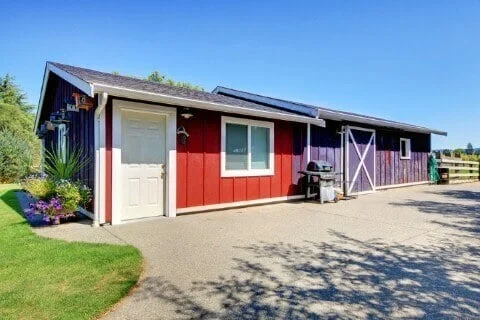11 Ways to Protect Your Backyard Shed from Moisture
Any Perth sheds, whether they are used as barns, garages, stables or storage sheds, are susceptible to moisture invading and collecting in the interior. Even in a climate as hot and dry as that of Perth, moisture can be a problem.

How Moisture Gets In
Most sheds have plenty of hidden entry points for moisture. If the shed is not correctly finished, moisture can seep in through the walls. If a shed is directly on the ground, water can seep up into the walls and the frame from points of contact with the ground. It can also enter through the panels via any growing vegetation that touches the them.
Build a Patio Stone Foundation
The simplest, easiest and cheapest way to build a foundation is to dig a foundation 5 cm deep into the lawn and then compress it with a rented compactor. Cut the patio stones down and fit them together as tightly as possible, then put fill between the stones to keep weeds from popping up. Your shed will fit quite nicely on top of the stones.
Build a Concrete Foundation
For a larger shed or a more solid foundation, make a 10cm mould out of 4 x 2 planks. Let the concrete cure for a week and then seal it. You can now build your shed on top.
Build a Plastic Foundation
You can build a plastic foundation out of grids that weigh 2 kg each. They are 50 cm x 50 cm x 5 cm and they interlock. If you want an exact size, you can cut the outside grids with a hacksaw, fill them with fine pea gravel and then build your shed on top. The grids are made of recycled plastic, giving you an environment-friendly foundation for your shed.
Install Vents and Windows
Windows have two purposes: they not only help ventilate your shed, but they also allow light into it, often saving you the expense of wiring your shed. Make sure that your windows are fit into perfectly-measured spaces on the wall and then use weatherstripping to seal them. This will keep precipitation out.
Install heat vents, especially in the Perth area. They can let hot air out and cool air in. Use weatherstripping or caulking to seal the vents.
Spacing for Air Circulation
Try to leave a gap of 5-10 cm from the wall to allow air to circulate through your shed. As with vents, the more air circulation you can get, the less chance of moisture sticking around.
Commercial Dehumidifying Products
You can buy many products that absorb moisture in your local home centre. They will be made out of materials such as sodium chloride, silica gel, potassium chloride, calcium chloride or alumina. Many of these will be toxic, so be careful around pets and children.
Charcoal Briquettes
If you have ever noticed, charcoal briquettes have a warning on the bag to store them in a dry place. It is because they are great at absorbing moisture from the air. They are inexpensive and can last for 30-60 days.
Kitty Litter
Kitty litter is repackaged and sold commercially to garages for oil spills. It will also absorb humidity from your air. Place a large, open bag in the middle of your shed.
Electric Fan
The underrated electric fan can increase air circulation and help keep the air in your shed dry. This will also help you avoid mould and mildew.
Electric Dehumidifier
If you are storing important records, electronic equipment or other semi-perishable items, you can buy a dehumidifier. This is a rather drastic solution but it can be worth it if your “cargo” is precious enough. You will need to empty the water tray regularly and the temperature can’t be below 21 degrees. This, of course, means you will need electricity.
Protecting your ZINCALUME and COLORBOND Steel Sheeting
While both substances are very strong and make for great storage sheds, they can be susceptible to moisture. You will want to avoid chronic water exposure for any steel shed. Steel can rust with too much exposure to water on a regular basis.
Clear debris from gutters. This will keep them from retaining water and allow them to do their job. Don’t immerse either steel in wet cement and try not to plant anything in the soil adjacent to your shed, as it will be chronically moist. Also, mulch, sand, compost and ashes should be avoided, as should garden debris such as leaves or grass cuttings.
Putting it Together
Talk to us at Action Sheds Australia for an assessment of your needs. We are Perth’s favourite one stop solution. Call 1300 778 628 today.



 1300 778 628
1300 778 628






